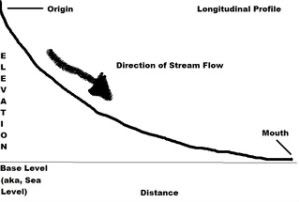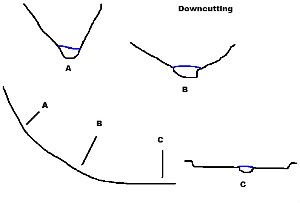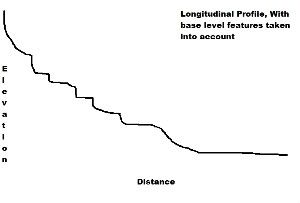quizbowl13 wrote:Paradox21 wrote:Yep, thanks. I was just going off memory. Four seems like a rather arbitrary number. I wonder why they picked that.
Maybe 5 seemed like too much. we may never know.
back to Idaho's question: Idaho, has anyone answered correctly yet?
Indeed, 4 pages seems like a little much
As for the question, No, but that’s partly my fault, as the question was poorly written. If I put this on my test, there a good chance it will be multiple choice.
The Answer to the question Is "Base Level Feature".
Base level is a concept from River Morphology. We recognize Base Level to mean "The lowest point to which a river can flow". Upon that thought, many of you are probably thinking the mouth of a river, or sea level. You would be absolutely correct. In the case for large rivers, a delta or Mouth of the river at sea level Is indeed a "Base Level", in fact, sea level itself is considered the "
Ultimate Base Level". How then can a waterfall be a base level? Well, some wonderfully drawn pictures (/sarcasm) should give some light on it.

This picture shows a Longitudinal Profile, or a General Profile of a river as compared to Distance and Elevation. As you can see on this picture, The origin Is at the highest Elevation, while the mouth is at the Ultimate Base Level. By looking at this graphic, we can make some general assumptions:
1. The closer to the origin you are, the faster the water will flow
2. The closer to the mouth you are, the slower the water will flow
3. Sediment will be scoured closer to the higher elevation
4. Sediment will be deposited at the lower elevations
5. There Is a higher stream gradient the closer to the origin you go
6. There is a lower stream gradient the closer to the mouth you go.
So how does this work into waterfalls? Let me show you with another concept: Downcutting!
Downcutting is the deepening of a river channel relative to its surroundings. That is, how far does it dig into the ground. As natural examples tell us, The amount of downcutting on a river is dependent on where on the river it forms. Look at this example:

This picture shows what downcutting looks like on a normal river. At point “A”, the river is very fast moving and at a higher elevation to that of sea level, so it downcuts at a steady rate. At point “B”, the river is slowing down some, and is getting closer to sea level, so downcutting is considerably slower here than at Point “A”, and at Point “C”, downcutting is almost non-existent. However, science has shown us that downcutting does not continue down to sea level at the same speed in all cases. This is where we dive into the base level features.
Let’s review what we have determined so far:
Base Level is the closest to sea level a river can go.
Downcutting helps a river in its descent to Ultimate Base Level
Now, if Downcutting doesn’t always continue to sea level, what blocks its path? Well, in order to understand this, we have to add a little onto our definition of a base level.
Base Level is the closest to sea level a river can flow at any one location. In other words, in real time, the base level at Point “A” on our graphic could be different to the Base Level of point “B”. It all depends on the rock layers. This is where we get into the final focus point.
At any one time, rock layers can dictate base levels.
Geologically speaking, nothing impedes downcutting. However, at our timescale, we can witness downcutting happening before our very eyes. That is essentially what a waterfall is, an agent of downcutting. Look at this graphic of a waterfall:

By looking at the graphic, we can determine a definition. A
Waterfall is a morphological feature defined by water flowing over a hard rock layer. In the case of most waterfalls, the water that flows over the falls erodes the softer layer at the base. Once it erodes enough, the unsupported hard layer above collapses. This is what makes a waterfall appear to “retreat”. So how does this fit into river morphology? It acts like a new point of origin. Look at this final graphic:

In actuality, this is what a longitudinal profile looks like, if you were to make it precise. Though mine is a sloppy mess, hopefully you can see what I’m trying to get across. It has these stair steps, base levels, that act as a mini origin, restarting the morphological process. These don’t have to be waterfalls. Lakes, other rivers, even manmade dams have this kind of effect.
Feel free to paste this into the wiki if anyone so desires.
As for downcutting, I’ll be going into that more on the next question, which reminds me…
Next Question:
The Grand Canyon is what type of Canyon? Explain in detail how it formed.



